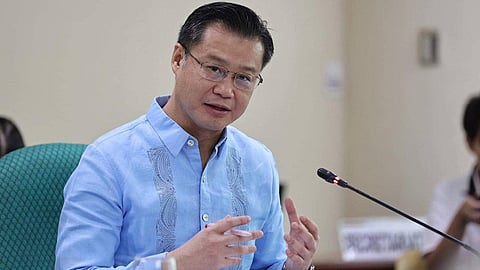
- NEWS
- the EDIT
- COMMENTARY
- BUSINESS
- LIFE
- SHOW
- ACTION
- GLOBAL GOALS
- SNAPS
- DYARYO TIRADA
- MORE

Senator Win Gatchalian is urging Congress to fast-track the passage of a law that would significantly strengthen the Philippines’ defenses against covert foreign operations.
The senator’s call comes after Defense Secretary Gilbert Teodoro confirmed the existence of deliberate efforts by foreign actors to exploit national security vulnerabilities, including through questionable identities and digital intrusion.
“Marami kasing nahuhuli, high-profile o hindi, nakakalusot sa mga awtoridad (Many are being caught—whether high-profile or not—but still, some manage to slip through the authorities),” Gatchalian said.
“Ginagamit pa, halimbawa, ang late registration tulad ng nakita natin kay Alice Guo o Guo Hua Ping, at marami pang iba (We’ve seen cases like Alice Guo or Guo Hua Ping and many others who have exploited loopholes such as late birth registration),” he added.
Gatchalian emphasized that the country’s current legal framework is outdated and insufficient to counter modern espionage threats, especially in the cyber domain.
He called for comprehensive legislative amendments to expand national security safeguards and bring the country's espionage laws into the digital age.
Earlier this year, Chinese national Deng Yuanqing and two Filipino accomplices were arrested for allegedly conducting surveillance on critical infrastructure amid growing tensions in the West Philippine Sea.
More recently, a suspected underwater drone with Chinese markings was recovered off the coast of Palawan, raising further concerns about unauthorized maritime surveillance.
Gatchalian warned that these are no longer isolated incidents.
Currently, espionage is penalized under Article 117 of the Revised Penal Code and Commonwealth Act No. 616, which prohibit acts such as spying, unauthorized disclosure of sensitive information to foreign powers, and unlawful access to military installations.
However, Gatchalian believes that these laws are outdated and fail to address modern espionage tactics, including cyber infiltration and digital identity fraud.
He stressed that any new legislation must give particular focus to cybersecurity and information warfare, citing the increasing use of digital tools by foreign operatives to infiltrate sensitive systems or manipulate public discourse.
The senator also proposed stricter background checks, digital identity verification, and enhanced coordination among security agencies as part of a broader national security strategy.
He added that national security should not take a backseat in legislative priorities.
